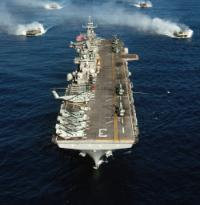In the 1980s, NATO ground troops in Europe faced a Warsaw Pact force of overwhelming size. To prepare to blunt a Soviet-led attack and overcome the Warsaw Pact's numerical superiority, NATO adopted a revolutionary new idea. The so-called "AirLand Battle" concept, which originated in the U.S. Army's training command, posited that forward-deployed NATO tanks and missile-armed infantry, supported by jet fighters carrying smart munitions, could beat a larger Warsaw Pact army.
In Europe, the AirLand Battle concept never had a chance to prove itself. But its tenets shaped the U.S. approach to ground warfare in Operation Desert Storm in 1991 as well as in the 2003 invasion of Iraq. Today, the U.S. Navy is hoping to capture some of the AirLand Battle's reforming potential as it scrambles to preserve its dominance of the western Pacific in the face of a rising Chinese military. But the emerging AirSea Battle doctrine risks foundering for a lack of cash and hardware. U.S.-allied governments that could help compensate for America's waning resources might be turned off by AirSea Battle's risky aims and aggressive overtones.
AirSea Battle originated in a classified memorandum signed by Gen. Norton Schwartz, Air Force chief of staff, and Chief of Naval Operations Adm. Gary Roughead in September 2009, according to a February report by the Washington-based Center for Strategic and Budgetary Assessments. CSBA maintains strong ties to the U.S. defense establishment and the Navy in particular. Former CSBA analyst Robert Work now serves as Navy under secretary.

